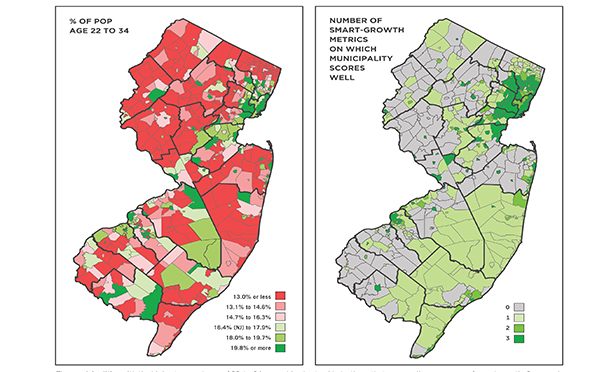
TRENTON, NJ—Millennials are gravitating to walkable, more urbanized locations with jobs, housing, entertainment and amenities all within easy reach, as Generation X did before them, but unlike the rest of the country, the Millennial population is shrinking in New Jersey.
New research by New Jersey Future suggests that affordability of housing is a major factor for Millennials who leave the state, according to Tim Evans, New Jersey Future's research director. Evans' research examined population shifts in New Jersey between 2000 and 2013, the most recent year data is available.
Listen to the complete conversation with New Jersey Future's Tim Evans in the player below.
You can download the New Jersey Future report here.
“It's not just the Gold Coast, it's all kinds of older, smaller cities and older suburbs where you're seeing Millennials congregating where they perhaps weren't in the past,” says Evans. “The kinds of places that now tend to have a higher percentage of younger people do tend to be walkable urban environments, but they are far from the only places that young people are flocking to, to the extent that they can afford to live in these places.”

What surprised Evans in the research was discovering that New Jersey's Millennial population actually declined while rising in the rest of the country.
“My guess is that the big reason for their leaving is that they couldn't afford to get their own places,” he says. “That's backed up by the fact that almost 50 percent of young adults in New Jersey are still living with their parents. That says to me that they're having trouble affording their own rent or buying their own house, if they want to stay in New Jersey.”
Building more housing would help to reduce the Millennial flight from New Jersey, Evans says.
“In particular, we don't have the type of housing that Millennials are looking for,” he says. “We're oversupplied with nine-room McMansions, but we don't have enough smaller units. We're starting to catch up with apartments, but for a long time we weren't building enough multifamily. We need a wider variety of housing types, and we need them in the kinds of places that Millennials want to live.”
Smart urban growth cities will do better than towns that resist new ways of thinking about development, Evans says. Robbinsville and Plainsboro both built town center developments on previously vacant land, and “other municipalities with plenty of undeveloped land could learn from their examples,” the New Jersey Future report says.
The report suggests that New Jersey could help towns engage in smart-growth development by: providing guidance and incentives for rethinking zoning and planning; promoting development policies offering resources for younger, entrepreneurial businesses; and creating pedestrian connections to transit stations and downtown destinations to make the towns more “walkable.”
Nevertheless, says Evans, some towns still meet with resistance from residents regarding walkable development.
“The municipal leaders are ahead of their constituents in understanding what's going on,” he says. “You have some mayors who see where things are going and they try to do these things and they get pushback from residents who are worried about traffic, or high density development. I do think they are starting to get it more.”
Want to continue reading?
Become a Free ALM Digital Reader.
Once you are an ALM Digital Member, you’ll receive:
- Breaking commercial real estate news and analysis, on-site and via our newsletters and custom alerts
- Educational webcasts, white papers, and ebooks from industry thought leaders
- Critical coverage of the property casualty insurance and financial advisory markets on our other ALM sites, PropertyCasualty360 and ThinkAdvisor
Already have an account? Sign In Now
*May exclude premium content© 2025 ALM Global, LLC, All Rights Reserved. Request academic re-use from www.copyright.com. All other uses, submit a request to [email protected]. For more information visit Asset & Logo Licensing.








